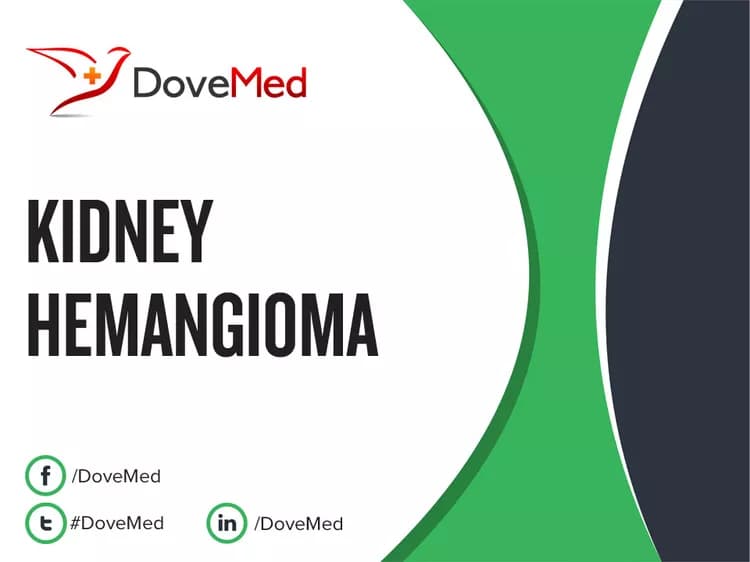What are the other Names for this Condition? (Also known as/Synonyms)
- Cavernous Hemangioma of Kidney
- Renal Angioma
- Renal Hemangioma
What is Kidney Hemangioma? (Definition/Background Information)
- Hemangiomas are benign malformation of blood vessels that can occur in a number of tissues such as the brain, kidney, liver, lung, skin (called cherry hemangioma), and nasal cavity
- Kidney Hemangiomas are rare, benign vascular tumors of the kidneys that are often observed in individuals under the age of 40 years. They are usually 1-2 cm in diameter
- Genetic conditions, such as Sturge-Weber-Krabbe syndrome or von Hippel Lindau (vHL) disease, may increase the risk of Kidney Hemangioma
- There are no known causes for the condition; however, some are known to arise from generalized hemangiomatosis within the liver, intestines, or brain
- Although many cases of Kidney Hemangiomas may be asymptomatic, they may present with the most common symptom, which is hematuria (blood in urine). Life-threatening complications, such as hemorrhage, can occur in some cases
- A preoperative diagnosis of the condition is very difficult to establish. A series of tests may be used to diagnose Kidney Hemangioma that includes (but is not limited to) MRI scan and angiography
- Kidney Hemangiomas are typically benign and do not cause any symptoms; therefore, most individuals do not require treatment. Severe cases may be treated using radiation therapy, laser-assisted ablation, endoscopic surgery, nephron sparing surgery, or a radical nephrectomy
Who gets Kidney Hemangioma? (Age and Sex Distribution)
- Kidney Hemangiomas can affect individuals of all races, ethnic backgrounds, and gender, across the world
- This condition can develop at any age; cases have been reported in both infants and individuals over the age of 80 years
- Kidney Hemangiomas most often occur between the ages of 30 and 40 years; 85% of all cases occur in individuals under the age of 40 years
It is important to note that having a risk factor does not mean that one will get the condition. A risk factor increases ones chances of getting a condition compared to an individual without the risk factors. Some risk factors are more important than others.
Also, not having a risk factor does not mean that an individual will not get the condition. It is always important to discuss the effect of risk factors with your healthcare provider.
What are the Risk Factors for Kidney Hemangioma? (Predisposing Factors)
Risk factors associated with Kidney Hemangioma include:
- Individuals with Sturge-Weber-Krabbe syndrome or von Hippel Lindau (vHL) disease may be at an increased risk of developing Kidney Hemangiomas
- Hemangiomas of the bowel, liver, bone, or brain may also increase the risk
What are the Causes of Kidney Hemangioma? (Etiology)
- Currently, there are no known causes for the development of Kidney Hemangiomas (also known as Renal Hemangiomas)
- They are known to develop from generalized hemangiomatosis (multiple hemangiomas) observed in other organs such as the liver, intestines, bone, or brain
What are the Signs and Symptoms of Kidney Hemangioma?
Kidney Hemangiomas are generally asymptomatic and do not present any signs and symptoms.
- The most common symptom is painless hematuria (blood in urine), which may be profuse or relapsing
- Pain, similar to renal colic (kidney stone), may be present in some individuals
How is Kidney Hemangioma Diagnosed?
A diagnosis for Kidney Hemangioma includes evaluating the clinical history (physical exam) and a thorough family history. It is very difficult to diagnose a Kidney Hemangioma. Some tools to help diagnose the condition may include:
- Renal angiography or CT scan of the kidney
- MRI scan of the kidney may also be performed to detect the hemangioma with greater resolution
Many clinical conditions may have similar signs and symptoms. Your healthcare provider may perform additional tests to rule out other clinical conditions to arrive at a definitive diagnosis.
What are the possible Complications of Kidney Hemangioma?
The complications associated with Kidney Hemangioma could include:
- Sometimes, Kidney Hemangiomas can cause a life-threatening hemorrhage (bleeding)
- Dilated blood vessels within the hemangioma may rupture, resulting in the formation of a blood cyst
- Patients who undergo treatment may be susceptible to surgical complications
How is Kidney Hemangioma Treated?
- Many cases of Kidney Hemangiomas are asymptomatic and benign, and therefore, do not require any treatment
- In the case of significant hematuria, abdominal pain, or potential malignancy, treatment may be considered
Treatment methods for Kidney Hemangiomas may include:
- Radiation therapy
- Laser-assisted ablation
- Endoscopic surgery
- Nephron sparing surgery
- Radical nephrectomy
Typically, nephron sparing surgery and radical nephrectomy are performed, only when malignancy of the tumor cannot be ruled-out.
How can Kidney Hemangioma be Prevented?
Currently there are no specific methods or preventative techniques for the formation of Kidney Hemangiomas.
What is the Prognosis of Kidney Hemangioma? (Outcomes/Resolutions)
- Kidney Hemangiomas are generally noncancerous and asymptomatic
- Hematuria may become less frequent or absent in patients who undergo treatment
- Individuals, who had a nephron sparing surgery or radical nephrectomy, may experience complications associated with loss of renal tissue
Additional and Relevant Useful Information for Kidney Hemangioma:
The following DoveMed website link is a useful resource for additional information:
Related Articles
Test Your Knowledge
Asked by users
Related Centers
Related Specialties
Related Physicians
Related Procedures
Related Resources
Join DoveHubs
and connect with fellow professionals


0 Comments
Please log in to post a comment.